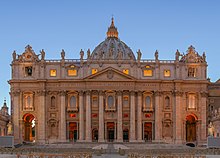Contents
| Part of a series on the |
| Catholic Church |
|---|
 |
| Overview |
|
|
Frequent Communion is the Roman Catholic practice of receiving the Eucharist frequently, as opposed to the usual medieval practice of receiving it once or a few times a year, by going to mass on Sundays.[1]
Although it is argued that in the early church the norm was communion of all Christians present at Mass,[2] before the Twentieth Century communion among the Catholic laity tended to be quite infrequent, sometimes only once a year. This was partly informed by the Jansenist fear that frequent communion would erode the faith.[3]
In the early Twentieth Century this began to change. Pope Leo XIII in his encyclical Mirae caritatis in 1902 argued for frequent communion as a source of renewal of faith with his successor Pius X arguing in his motu proprio Sacra Tridentina[4] that the laity should receive communion as frequently as possible. In his encyclical Quam singulari Pius also relaxed restrictions on reception of Communion for the sick[5] and children.[6]
Regarding weekly versus daily communion, St. Francis de Sales encouraged weekly communion, but he neither encouraged nor discouraged daily communion.[7]
References
- ^ Frequent Communion - Catholic Encyclopedia article
- ^ From Altar-Throne to Table: The Campaign for Frequent Holy Communion in the Catholic Church. Scarecrow Press. 16 April 2010. ISBN 9780810870925.
- ^ Casarella, Peter J., "Eucharist and Sacrifice: Spiritual Renewal in Early Twentieth Century", The Oxford Handbook of Sacramental Theology, (Hans Boersma, Matthew Levering, eds.), OUP Oxford, 2015 ISBN 9780191634185
- ^ A Decree on Frequent and Daily Reception of Holy Communion - https://www.catholicculture.org/culture/library/view.cfm?recnum=5195
- ^ Communion of the Sick - Catholic Encyclopedia article
- ^ QUAM SINGULARI - Papal Encyclical
- ^ St. Francis de Sales (2002). Introduction to the Devout Life. Random House, Inc. pp. 79–80. ISBN 0-375-72562-8.
Bibliography
- Antoine Arnauld, De la fréquente communion (1643)

